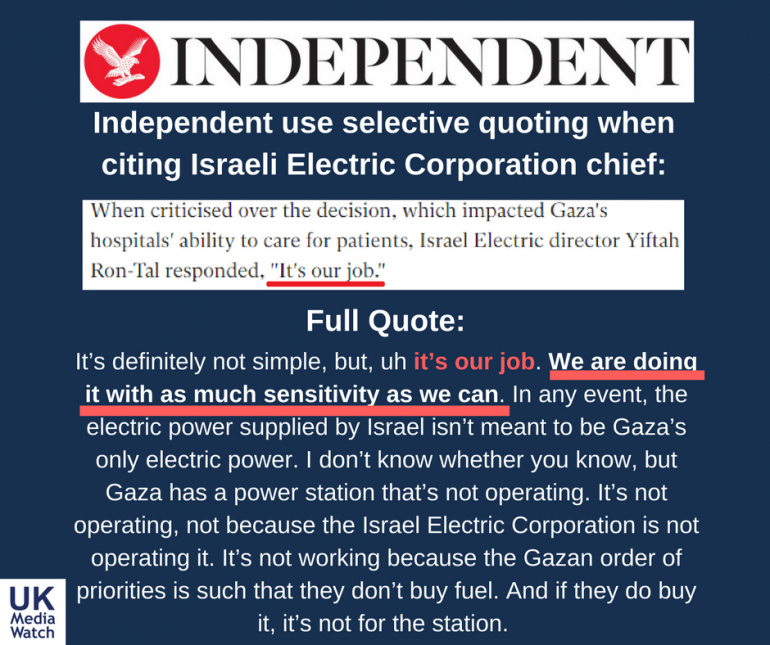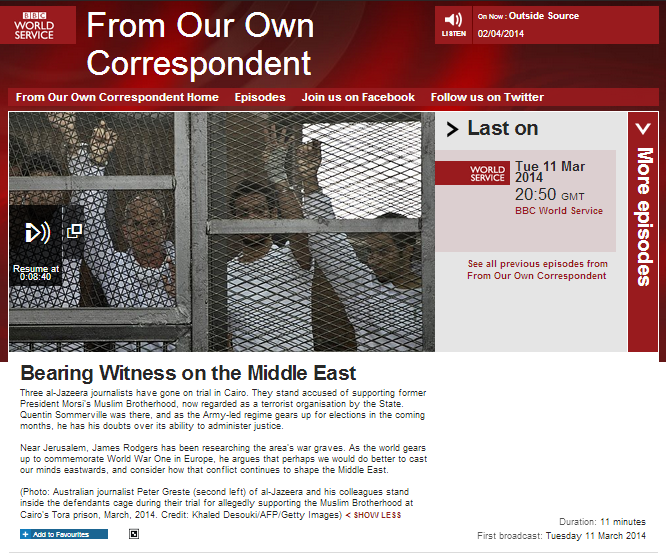An article published at The Independent (Gaza’s only power plant back online after two months following emergency fuel delivery from Egypt, June 23) grossly distorted the comments of Yiftah Ron-Tal, chairman of Israel Electric Corporation, regarding the electricity shortage in Gaza.
The article, by Mid-East correspondent Bethan McKernan, does at least touch upon the fact that a power struggle between Hamas and the PA lies at the root of the Strip’s current electricity shortage. But, she also added the following about Israel’s putative role in the crisis.
Israel was still covering around one-third of Gaza’s power needs, but in the last few days the flow had been cut by 40 per cent at Mr Abbas’ request, the AP reported. When criticised over the decision, which impacted Gaza’s hospitals’ ability to care for patients, Israel Electric director Yiftah Ron-Tal responded, “It’s our job.”
However, the quote, suggesting that head of Israel Electric was indifferent to the suffering of Gazans, was cherry picked from a longer interview published at Haaretz on June 23. As you’ll see, the ambush interview by Haaretz journalist Nir Gontarz is appallingly unprofessional but nonetheless at least includes Ron-Tal’s full reply.
Here are some excerpts:
Haaretz: You are subject to the government’s decisions, right?
Yiftah Ron-Tal: We operate in accordance with the decisions of the security cabinet.
Haaretz: And how does it feel to cut back the power supply to people who are already miserable? Is there any feeling connected with it, or is it: The government ordered it – and that’s that?
Yiftah Ron-Tal: It’s accompanied by a great deal of feeling, and we are doing it in coordination, as much as possible, with the company the Gazan provider company. We are coordinating this thing with them so that they will be able to manage it. The crisis.
Haaretz: From the Egyptians – given their struggle against the Muslim Brotherhood and its Hamas branch – I’d expect nothing. I am an Israeli citizen, and my expectations are from the Israeli government, and for it not to exacerbate the humanitarian crisis in Gaza. Beyond that, Israel is still maintaining a type of siege of the Gaza Strip. A maritime, aerial and also ground siege. It’s not a sovereign state that we’re doing a favor for by giving them electricity.
Yiftah Ron-Tal: I am not a politician. I am the director of an electric company. I am doing the best I can. We are doing it with the highest sensitivity.
Haaretz: How do you cut off power to hospitals with sensitivity?
Yiftah Ron-Tal: I hope things will work out. That the electricity will be paid for and we will supply all we can. Even if we supply the entire amount possible, we can supply Gaza with slightly more than 50 percent.
Now, here’s the bit with the quote used by the Indy reporter – in bold below.
Haaretz: Listen, electricity in part means enjoying privileges like we have here in Israel – air conditioners, coffee machines. But electricity is also resuscitators and incubators for premature babies, and in operating rooms. And also for sewage facilities. Even without this, Gaza is on the brink of collapse. To turn this into a financial consideration is a bit problematic. No?
Yiftah Ron-Tal: Uhhh, it’s definitely not simple, but, uh it’s our job. We are doing it with as much sensitivity as we can. In any event, the electric power supplied by Israel isn’t meant to be Gaza’s only electric power. I don’t know whether you know, but Gaza has a power station that’s not operating. It’s not operating, not because the Israel Electric Corporation is not operating it. It’s not working because the Gazan order of priorities is such that they don’t buy fuel. And if they do buy it, it’s not for the station. There is also Egyptian electricity that is supposed to be supplied, via Rafah. Those are [power] lines that are supposed to provide more than 10 percent of Gaza’s consumption. Those lines haven’t been working for a few months already.
Ron-Tal’s reply to the questions posed by Haaretz consisted of over 365 words. It included replies clearly expressing concern with the impact of his decisions on Palestinians, and also provided context on the complicating factors at play and Hamas’s role in the shortage. By citing just three of those words (“it’s our job”), the Indy journalist did what the Indy and other UK media outlets do best: taking the comments and actions of Israelis and Israeli leaders out of context to impute maximum malevolence.
Related Articles:
- BBC’s silence on Gaza’s missile attack continue (BBC Watch)
- NBC blinders on Egyptian blockade (CAMERA)



